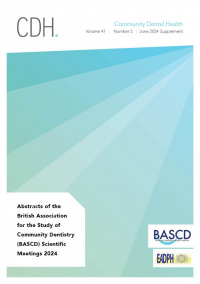June 2006
Editorial - Providing children with the quality dental care they deserve
Abstract
We have some of the best data for the dental disease experience in children in the United Kingdom through a tradition of dental health surveys carried out every 10 or so years. Over the last 30 years, these surveys have provided us with figures which have been interpreted by the academics in Dental Public Health and politicians alike to convey to the world the tremendous dental health that children of the United Kingdom enjoy. But these headline statistics mask the high levels of disease borne by many children usually from deprived backgrounds. It also masks the fact that this burden of managing these high levels of disease falls upon the shoulders of the clinicians at the coal face. These clinicians face the unenviable task of dealing with a population with many social problems and a service that is woefully under funded. Given this background it is no surprise that the published Care Index for 5-year-old children (Pitts et al., 2005), reflecting the percentage of caries that is treated with restorative care, is a matter of national shame. Even for 11-year-old children, where only caries in the permanent teeth at the level of dentine was considered, the care index on average was around 41% but could be as low as 20% in some parts of the country (Pitts et al., 2006), meaning that in some areas four out of five permanent decayed teeth where caries was into dentine were not being restored. These figures should send a shiver down the spine of every dental health professional, who believes that dentistry is a caring profession. How can we condone the non treatment of a disease that carries such a high morbidity and knowingly put the child at risk of pain and suffering? The recent debate in the U.K on whether to restore decayed primary teeth at all was sparked by the publication of a paper (Tickle et al., 2002) in which the discussion, conclusions and extrapolation of the results by the authors were in many instances speculative and not always a true reflection of the methods used and of the results of the study. The most important conclusion of the study that there was no difference in the outcome measures of pain, extractions etc. between teeth that were restored or left unrestored cannot stand up to scrutiny because the quality of the restorations performed in the teeth to which the unrestored teeth were compared was unspecified. Other studies have shown that untreated caries in young children, especially preschoolers carries a high morbidity, including pain (Levine et al., 2002; Shepherd et al., 1999). A more recent study (Pine et al., 2006) clearly showed that the proportion of children with sepsis increases markedly with caries experience and this problem can be mitigated if more caries is treated. The authors, who based their findings on a sample of nearly seven thousand 5-year-old children in Scotland, concluded rightly that the findings of their study would not support a policy of non-intervention for primary teeth.




